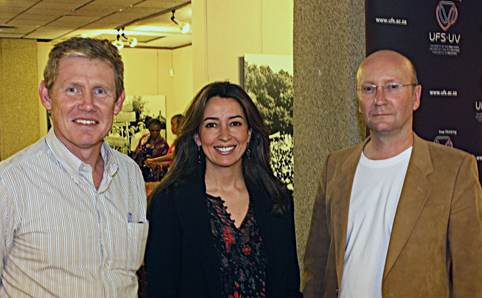 |
|
The popular short course in population environment development (PED) nexus, presented by our university, in collaboration with other partners started on 13 April 2011. Here are from left: prof. Lucius Botes, Dean: Humanities; me. Nabila Lejri a participant in the course from Tunisia, and prof. André Pelser, from our Department of Sociology.
Photo: Earl Coetzee
|
The popular short course in population environment development (PED) nexus, which is presented by our university, in collaboration with other partners started on 13 April 2011.
Various international guests from, amongst others, Vietnam, Tunisia, Gabon and Zimbabwe, attended the welcoming function in the Johannes Stegman Gallery on our Main campus.
According to Prof. André Pelser, from our Department of Sociology, the theoretical part will be presented on the campus, whereafter the practical component will be presented at the Golden Gate Highland National Park.
"The course investigates how we (mankind) can develop sustainably in an integrated manner in the midst of demographic changes, environmental issues and developmental challenges."
He says that the course is geared towards equipping programme leaders and mid-level managers to implement developmental programmes by means of extended networks, as well as to sensitise politicians about population and environmental issues.
This training offered in the Free State forms part of a series of training sessions presented internationally.